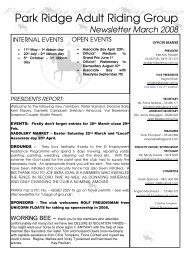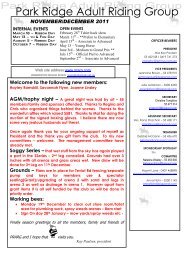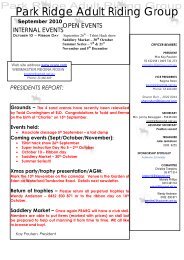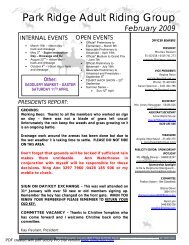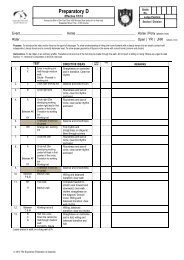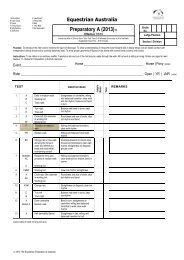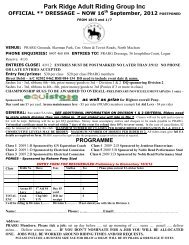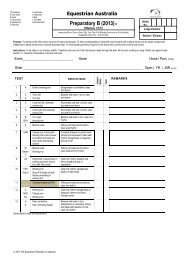Create successful ePaper yourself
Turn your PDF publications into a flip-book with our unique Google optimized e-Paper software.
What to do<br />
The severity of the case will dictate what you do when you find your horse<br />
showing signs of colic. If he is behaving violently call your veterinarian<br />
immediately. Violent behaviour usually equates with great pain which usually<br />
equates with a serious case of colic. Time is of the essence here. Not all<br />
horses show the same severity of signs with the same type of colic, though,<br />
and some horses may become quite violent with a relatively "mild" case. If<br />
the signs of pain are less extreme, you can take a few minutes to observe the<br />
horse's appearance and behaviour before calling the veterinarian.<br />
• If possible, take his temperature, pulse and respiration rates.<br />
• Note what his appetite has been like in the past day or so, and the<br />
consistency and frequency of defecation.<br />
• Has his water intake been normal?<br />
• Are his gums a normal colour?<br />
• Think about whether he has had access to any unusual feedstuffs in<br />
the past day or so, whether any medications have been administered,<br />
and whether there have been any changes in management.<br />
Now call your veterinarian. It is important to take all food away from the<br />
horse until the veterinarian arrives. If he is nibbling at his bedding, find a way<br />
to prevent this. Walking the horse can be a useful way of distracting him from<br />
the pain, but he should not be walked to exhaustion. If the horse insists on<br />
rolling, there will be little you can do to prevent it. If possible, try to get the<br />
horse to an area where he will do himself the least damage when he rolls. But<br />
do not get hurt yourself. Do not administer any drugs until your veterinarian<br />
has seen the horse, or unless he/she tells you to do so.<br />
Prevention of colic<br />
If you happen to be a horse, colic is probably an unfortunate fact of life.<br />
Annual colic incidences of approximately 10% are quite common. Listed below<br />
are some of the management factors which are thought to reduce colic<br />
incidence. Horses which fall into high-risk categories, such as stabled horses<br />
in intense training and fit horses recently injured, should be monitored<br />
particularly closely.<br />
allow as much turnout as possible<br />
maintain a regular feeding schedule<br />
ensure constant access to clean water<br />
provide at least 60% of digestible energy from forage<br />
do not feed excessive digestible energy<br />
do not feed mouldy hay or grain<br />
feed hay and water before grain<br />
provide access to forage for as much of the day as possible<br />
do not over graze pastures<br />
do not feed or water horses before they have cooled out<br />
maintain a consistent exercise regime<br />
make all changes in diet, exercise level and management slowly<br />
control intestinal parasites and assess efficiency periodically.<br />
Author Janet Douglas earned her degree in Veterinary Medicine at the<br />
University of Cambridge, England. She continued her pursuit of<br />
excellence at the Equine Research Centre, Guelph, Ontario, where she<br />
focused on equine orthopaedics.<br />
Thanks Regina for the article



